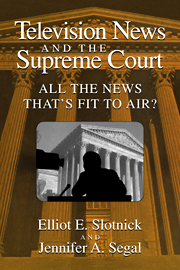Book contents
- Frontmatter
- Contents
- List of Tables
- Acknowledgments
- 1 Television News: A Critical Link between the Supreme Court and the American Public
- 2 The Supreme Court Beat: A View from the Press
- 3 Television News and the Supreme Court: Opportunities and Constraints
- 4 A Tale of Two Cases: Bakke and Webster
- 5 A Tale of Two Terms: The 1989 and 1994 Court Terms
- 6 “The Supreme Court Decided Today …” – or Did It?
- 7 Which Decisions Are Reported? It's the Issue, Stupid!
- 8 Television News and the Supreme Court: All the News That's Fit to Air?
- Appendix: Schedule of Interviews
- Notes
- References
- Index
1 - Television News: A Critical Link between the Supreme Court and the American Public
Published online by Cambridge University Press: 18 December 2009
- Frontmatter
- Contents
- List of Tables
- Acknowledgments
- 1 Television News: A Critical Link between the Supreme Court and the American Public
- 2 The Supreme Court Beat: A View from the Press
- 3 Television News and the Supreme Court: Opportunities and Constraints
- 4 A Tale of Two Cases: Bakke and Webster
- 5 A Tale of Two Terms: The 1989 and 1994 Court Terms
- 6 “The Supreme Court Decided Today …” – or Did It?
- 7 Which Decisions Are Reported? It's the Issue, Stupid!
- 8 Television News and the Supreme Court: All the News That's Fit to Air?
- Appendix: Schedule of Interviews
- Notes
- References
- Index
Summary
“If it didn't happen on network television, then it didn't happen.”
Ron Nessen, former network news correspondent and presidential press secretary (Quoted in Michael J. Robinson and Margaret A. Sheehan, Over the Wire and on TV: CBS and UPI in Campaign '80)In democratic political systems, the interaction and communication between political elites and institutions and the mass public are considered of primary importance. Because democratic governments are established to serve their citizens, the flow of information between elites and masses is critical to the functioning of these governments and to their perceived legitimacy. Ideally, effective democratic citizenship requires that the people know about the activities of their officials and institutions so that they may protect their interests by evaluating and holding them accountable for their actions. Political information is significant for the optimal functioning of this process (Berkman and Kitch, 1986; Lippmann, 1922). As Michael Delli Carpini and Scott Keeter have argued, “[our] system can be very responsive to the interests of civically engaged citizens. But to take even modest advantage of these opportunities, citizens need a number of political resources. Central among these resources is political information” (1996: 59).
Knowledge and understanding about things political are sometimes attained through firsthand experiences. Our lives (or those of our family and friends) are influenced by the laws of the country, we may go to candidates' speeches, write letters to legislators and executives, and receive political pamphlets from them, and we may talk to our family members, friends, and colleagues. From these experiences, we may learn and form opinions about our government and the people who work there.
- Type
- Chapter
- Information
- Television News and the Supreme CourtAll the News that's Fit to Air?, pp. 1 - 15Publisher: Cambridge University PressPrint publication year: 1998



